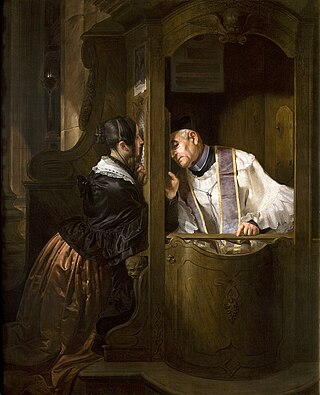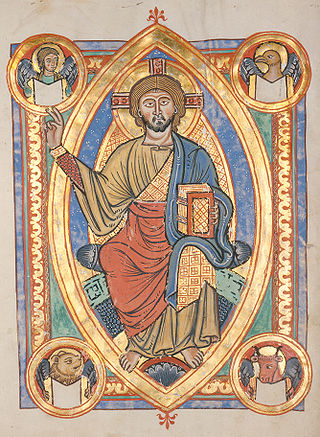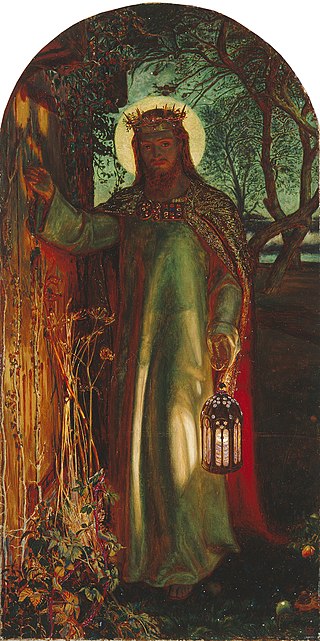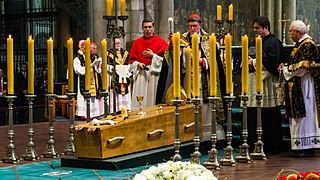Related Research Articles

Confession, in many religions, is the acknowledgment of sinful thoughts and actions. This may occur directly to a deity or to fellow people.

Penance is any act or a set of actions done out of repentance for sins committed, as well as an alternate name for the Catholic, Lutheran, Eastern Orthodox, and Oriental Orthodox sacrament of Reconciliation or Confession. It also plays a part in confession among Anglicans and Methodists, in which it is a rite, as well as among other Protestants.

The epiclesis refers to the invocation of one or several gods. In ancient Greek religion, the epiclesis was the epithet used as the surname given to a deity in religious contexts. The term was borrowed into the Christian tradition, where it designates the part of the Anaphora by which the priest invokes the Holy Spirit upon the Eucharistic bread and wine in some Christian churches. In most Eastern Christian traditions, the Epiclesis comes after the Anamnesis ; in the Western Rite it usually precedes. In the historic practice of the Western Christian Churches, the consecration is effected at the Words of Institution though during the rise of the Liturgical Movement, many denominations introduced an explicit epiclesis in their liturgies.

In Christianity, contrition or contriteness is repentance for sins one has committed. The remorseful person is said to be contrite.

Consecration is the transfer of a person or a thing to the sacred sphere for a special purpose or service. The word consecration literally means "association with the sacred". Persons, places, or things can be consecrated, and the term is used in various ways by different groups. The origin of the word comes from the Latin stem consecrat, which means dedicated, devoted, and sacred. A synonym for consecration is sanctification; its antonym is desecration.

Absolution is a theological term for the forgiveness imparted by ordained Christian priests and experienced by Christian penitents. It is a universal feature of the historic churches of Christendom, although the theology and the practice of absolution vary between Christian denominations.

The Confiteor is one of the prayers that can be said during the Penitential Act at the beginning of Mass of the Roman Rite in the Catholic Church. It is also said in the Lutheran Church at the beginning of the Divine Service, and by some Anglo-Catholic Anglicans before Mass.

The Penitential Act is a Christian form of general confession of sinfulness that normally takes place at the beginning of the celebration of Mass in the Roman Rite of the Catholicism, as well as in Lutheranism. In Anglicanism, it is said as part of the Eucharist, but it is not considered an official sacrament.

The prayer before a crucifix is a Roman Catholic prayer to Jesus. It is often said by Roman Catholics after Communion or after Mass. The faithful receive a partial indulgence if they recite the prayer after Communion before a crucifix. On the Fridays of Lent, the indulgence is a plenary indulgence.

A grace is a short prayer or thankful phrase said before or after eating. The term most commonly refers to Christian traditions. Some traditions hold that grace and thanksgiving imparts a blessing which sanctifies the meal. In English, reciting such a prayer is sometimes referred to as "saying grace". The term comes from the Ecclesiastical Latin phrase gratiarum actio, "act of thanks." Theologically, the act of saying grace is derived from the Bible, in which Jesus and Saint Paul pray before meals. The practice reflects the belief that humans should thank God who is believed to be the origin of everything.

The Sinner's prayer is a Christian evangelical term referring to any prayer of repentance, prayed by individuals who feel sin in their lives and have the desire to form or renew a personal relationship. This prayer is not mandatory but, for some, functions as a way to communicate with and understand their relationship with God through Jesus Christ. It is a popular prayer in evangelical circles. While some Christians see reciting the Sinner's prayer as the moment defining one's salvation, others see it as a beginning step of one's lifelong faith journey.
The Sacrament of Penance is one of the seven sacraments of the Catholic Church, in which the faithful are absolved from sins committed after baptism and reconciled with the Christian community. During reconciliation, mortal sins must be confessed and venial sins may be confessed for devotional reasons. According to the dogma and unchanging practice of the church, only those ordained as priests may grant absolution.

Thanksgiving after Communion is a spiritual practice among Christians who believe in the Real Presence of Jesus Christ in the Communion bread, maintaining themselves in prayer for some time to thank God and especially listening in their hearts for guidance from their Divine guest. This practice was and is highly recommended by saints, theologians, and Doctors of the Church.
Good Friday Prayer can refer to any of the prayers prayed by Christians on Good Friday, the Friday before Easter, or to all such prayers collectively.

Catholic tradition and Mariology include specific prayers and devotions as acts of reparation for insults and blasphemies against Mary, mother of Jesus, often known as the Blessed Virgin Mary to Catholics. Similar prayers as Acts of Reparation to Jesus Christ and Acts of Reparation to The Holy Trinity also exist.
The usual beginning is the series of prayers with which most divine services begin in the Eastern Orthodox Church and those Eastern Catholic Churches which follow the Byzantine Rite.

Absolution of the dead is a prayer for or a declaration of absolution of a dead person's sins that takes place at the person's religious funeral.
In the Lutheran Church, Confession is the method given by Christ to the Church by which individual men and women may receive the forgiveness of sins; according to the Large Catechism, the "third sacrament" of Holy Absolution is properly viewed as an extension of Holy Baptism. Unlike Roman Catholicism, the practice of private confession in the Lutheran Church is voluntary, not obligatory.

Spiritual communion is a Christian practice of desiring union with Jesus Christ in the Eucharist. It is used as a preparation for Mass and by individuals who cannot receive Holy Communion.
The Compline Choir is a nationally acclaimed choral group that chants the Office of Compline every Sunday night, 9:30 P.M. Pacific time, at St. Mark's Cathedral in Seattle, Washington, US. The Office of Compline is made up of sacred music including plainsong and polyphonic compositions, and chanted recitations of the Apostles' Creed and the Lord’s Prayer.
References
- ↑ Bowden, John; Bowden, John Stephen (2005). Christianity: The Complete Guide. Continuum. ISBN 9780826459374 . Retrieved 14 July 2015.
Forms for the reconciliation of a penitent may also be found in contemporary prayer books of Anglican, Lutheran, Methodist and Reformed Churches.
- ↑ "Enchiridion Indulgentiarum quarto editur". Archived from the original on 2010-01-14. Retrieved 2009-12-05.
- 1 2 "Dohogne, David J., "Act of Contrition can be very personal", Roman Catholic Diocese of Springfield-Cape Girardeau". Archived from the original on 2016-11-16. Retrieved 2016-11-16.
- ↑ Sheen, Fulton. Life is Worth Living, Ignatius Press, 1999 ISBN 9780898706116
- ↑ "Catechism of the Catholic Church". Archived from the original on 2019-04-05. Retrieved 2019-03-25.
- ↑ "Catechism of the Catholic Church §1453". Archived from the original on 2019-04-05. Retrieved 2019-03-25.
- ↑ "Thesaurus Precum Latinarum". Preces-latinae.org. Retrieved 2012-03-17.
- ↑ Sacra Congregatio pro Cultu Divino, Rituale romanum ex Decreto sacrosancti oecumenici concilii Vaticani II instauratum auctoritate Pauli PP. VI promulgatum. Ordo paenitentiae. Editio typica, Typis Poliglottis Vaticanis, 1974, pag. 27.
- ↑ "Act of Contrition," [ permanent dead link ] Vatican News. Retrieved 2020-03-31
- ↑ A version without line breaks and slightly different punctuation: Third Plenary Council of Baltimore (1888). A Manual of Prayers: For the Use of the Catholic Laity. Catholic Publication Society Company. p. 286 . Retrieved April 15, 2019.
O my God, I am heartily sorry for having offended Thee, and I detest all my sins, because I dread the loss of heaven and the pains of hell,.
- ↑ "Canadian Conference of Catholic Bishops". Cccb.ca. 2006-10-04. Archived from the original on 2008-09-21. Retrieved 2012-03-17.
- ↑ "Act of Contrition Prayer Cards". 2007-02-24. Retrieved 2013-03-20.
- ↑ Butler, James. The most R. Dr. James Butler's catechism; revised, enlarged, approved and recommended by the four R.C. Arch. of Ireland, The Catholic Book society, Dublin, 1836
- ↑ Pope Paul VI. Sacrosanctum concilium, December 4, 1963
- ↑ Gaupin, Linda. Embracing the Vision: Sacramental Catechesis for First Reconciliation and First Communion, Twenty-Third Publications, 2007 ISBN 9781585956449
- ↑ Farren, Paul. Confession: Finding Freedom and Forgiveness, Paraclete Press, 2014 ISBN 9781612615981
- ↑ Common Worship Reconciliation of a Penitent Form One, Church House Publishing, 2006 ISBN 9780715121047
